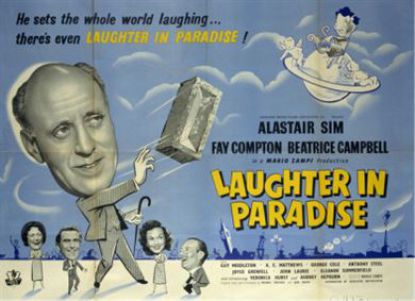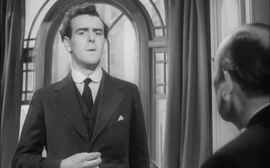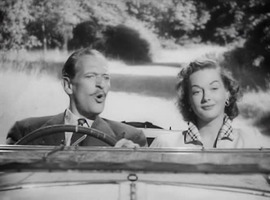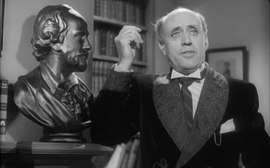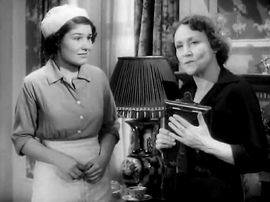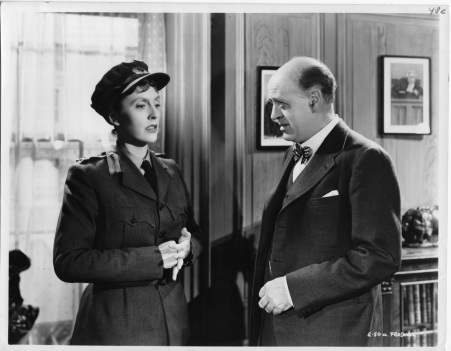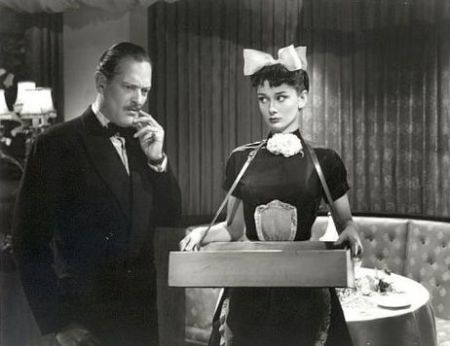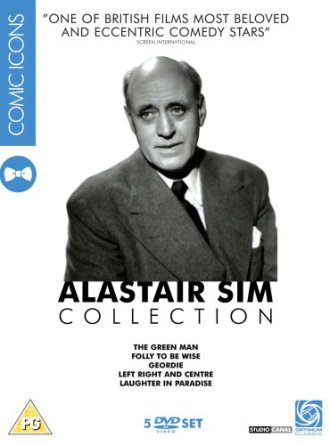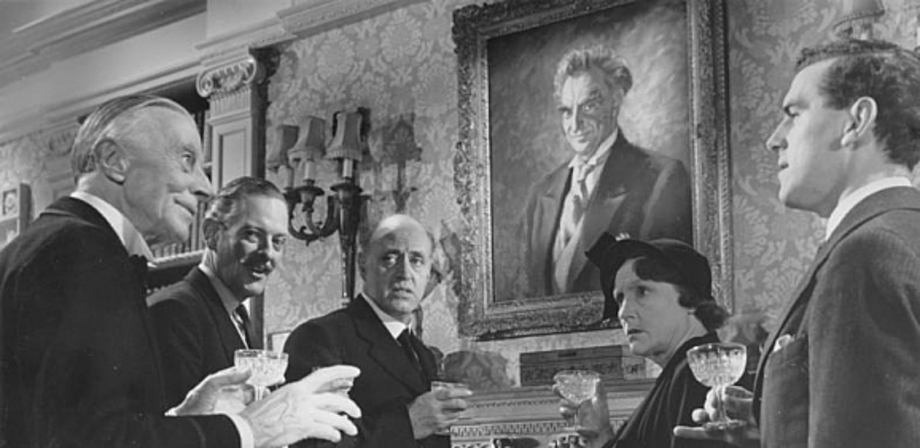
LAUGHTER IN PARADISE (1951)
Laughter in Paradise is one of a number of light, unassuming, pleasant comedies made in the 1950s, often featuring Alastair Sim in the main role; others include The Happiest Days of Your Life, Left, Right and Centre, and The Green Man. The plot is simple; Henry Russell (Hugh Griffiths, seen briefly at the start), a well-known practical joker, finally dies and his relatives gather to hear the will (although he is so renowned as a practical joker that at first some of them are not sure this is not just another prank). They are rather a motley crew, and we are introduced to them all in little vignettes so that we can get the measure of them; his sister Agnes Russell (Fay Compton) is a harsh 'old maid' who treats her own servant abominably, Capt Deniston Russell (Alastair Sim) is outwardly, well, Alastair Sim, but has a secret double life as a writer of trash fiction of the American 'slug 'em in the kisser' variety, Simon Russell (Guy Middleton) is a love 'em and leave 'em philanderer, whilst Herbert Russell (George Cole) is a timid bank clerk afraid of his own shadow.
The will is read out by Endicott (Ernest Thesiger), and each is to receive £50,000 (quite nice now, but an astronomical figure then) but...there are conditions. Each has to carry out a task, within one week, ideally suited to test each of their temperaments and characteristics. They must not reveal to anyone outside the room any of the details of the tasks or the instructions relating to the will, and if anyone contests the will, all the money will be forfeited; click on each of the images below to see what their individual conditions are:
As is often the case, the stories are by no means equal in terms of interest and humour. Unsurprisingly, the best segment by a country mile is the one involving Alastair Sim, as the mild and unassuming Captain Deniston Russell. When we first see him, he is dictating the opening chapter of his new novel, 'Blood Lust', to his admiring and devoted secretary Sheila Wilcott (Eleanor Summerfield) beginning:
"I walked into the room and there stood Petal, her silken hair langorously caressing one fair cheek, her lips red and inviting. I walked over to her, and slugged her in the mouth". No, no, change that Miss Wilcott, change that to "slugged her in the kisser". "Before going down, she threw me a single glance of searing hate suffused with scorn. She was certainly a swell tomato" [Miss Wilcott]: That's a beautiful beginning Captain Russell, it really is!
Deniston's problem (apart from being blind to the love and devotion of Miss Wilcott) is that he is engaged (for 10 years) to his fiancee, Elizabeth 'Fluffy' Robson (the always wonderful Joyce Grenfell, right, who else?) whose father (A.E. Matthews) just happens to be a magistrate. Being unable to let her know what is happening, he has to postpone the wedding yet again - for 28 days, obviously - but manages to let Fluffy and her father believe that he is going away on secret service hush-hush business ("You're not going behind the Iron Curtain?" gushes Elizabeth wonderingly, to which Deniston replies "I suppose you could put it like that...").
Seeking advice from the police (including Leslie Dwyer as a desk Sgt, although Colin Gordon is wasted in his very brief cameo) as to what sort of crimes would attract a sentence of 28 days, he initially decides upon a spot of shoplifting, which leads to a very funny scene in a department store where he finds (unlike Margaret Rutherford in Trouble in Store) that it is not as easy as he thought to get arrested for the offence, but he finally hits upon a bit of good old-fashioned smash-and-grab:
Of course, when he appears in court guess who the magistrate is? It looks as though the Captain will win his £50,000, but lose Fluffy, alhthough he is beginning to wonder if that is such a bad outcome, and in any case Miss Wilcott is standing by his side as always.
Sim's protege, George Cole, although he cannot compete with Sim's comic acting, also has quite a good storyline to himself, as the archetypal mild-mannered bank clerk, browbeaten by his overbearing and insufferable work colleague and tyrannised by his dictatorial boss Mr Wagstaff (Ronald Adam). Here's an early scene where he tries a dummy run of the hold up he must undertake:
Agnes Russell's segment is, to modern eyes and ears, probably the dullest, as it is the most sentimental section, with a moral lesson to be learnt (although of course that was always Henry Russell's intention in setting her the task). It is somewhat enlivened by her pernickety and demanding boss being John Laurie, but it struggles with a sub-plot involving his daughter Joan and the blossoming romance between Joan and the private detective hired by Laurie, when his suspictions are arounsed by Agnes promising to pay him £1000 to stay in his employ, as this scene shows:
Fay Compton is ideal as the miserable, joykiller Agnes (I remember her particularly as Mrs Josser in London Belongs to Me, where her miserablism [what do you mean, it's not a word, course it is, ask The Pet Shop Boys] weighs down everyone around her, including the viewer) but fails to convince as the new, happy-go-lucky spinster who has learnt her lesson.
Although short on laughs, Guy Middleton's storyline is at least sharper, as he plots and schemes to make sure that he marries the right woman, which in his view means not only someone attracitve but also a woman who has her own money, rather than end up as a drain on him. He actually speaks to Audrey Hepburn first of all, playing a cigarette girl (right), but as he is clearly a cad and a bounder (albeit a likeable one) this breaking of the rule is no surprise (but he makes sure that cousin Deniston doesn't see him conversing with Ms H). Incidentally, this appearance of Hepburn is described on wikipedia as her first professional appearance on film, save for a brief cameo in a Dutch film in 1948, but this is not correct; she had a very similar, blink-and-you'll-miss-her appearance at the start of the The Lavender Hill Mob in the same year, where Alec Guinness tips her as he revels in the attention he attracts as a man-about-town in South America. Anyway, he then settles on Lucille Grayson (Beatrice Campbell) whom he picks up (or thinks he does) whilst out driving. Benson (Mackenzie Ward), his butler and general manservant, assists him in his machinations, but the last laugh may be on Simon:
In some respects Guy Middleton was a poor man's Terry-Thomas, and there is no doubt that the latter would have brought more natural merriment to the proceedings, but Middleton can ast least lay claim to one of the great lines in British films, one that now makes me laugh and wince simultaneously, from The Happiest Days of Your LIfe: "I say, you girls are bang on for 17!"
Only Agnes has failed in her bid to win her share of the will, but there is of course a sting in the tale as the four of them gather to report back to Endicott...
In terms of screen time, I have no doubt that an audit would show that Alastair Sim has the lion's share, and quite rightly so; whilst the film is fondly remembered, I would bet that those fondly remembered scene(s) are highly likely to involve him and, by extension, Joyce Grenfell. There was a remake, which I've seen but can't remember very well, made in 1970 and entitled Some Will, Some Won't, a better title but not the most obvious one, which is surely Where there's a Will (I've just checked and it was taken in 1955 for a film which I've not seen and that by coincidence also stars George Cole).
The actual DVD doesn't seem to be available, but a better buy in any case is the Alastair Sim collection (see right) which has this film, The Green Man, Left Right and Centre and Folly to be Wise on as well, so excellent value even if you have little time for Geordie, the 5th film in the box set; I bought my copy for around £14.
